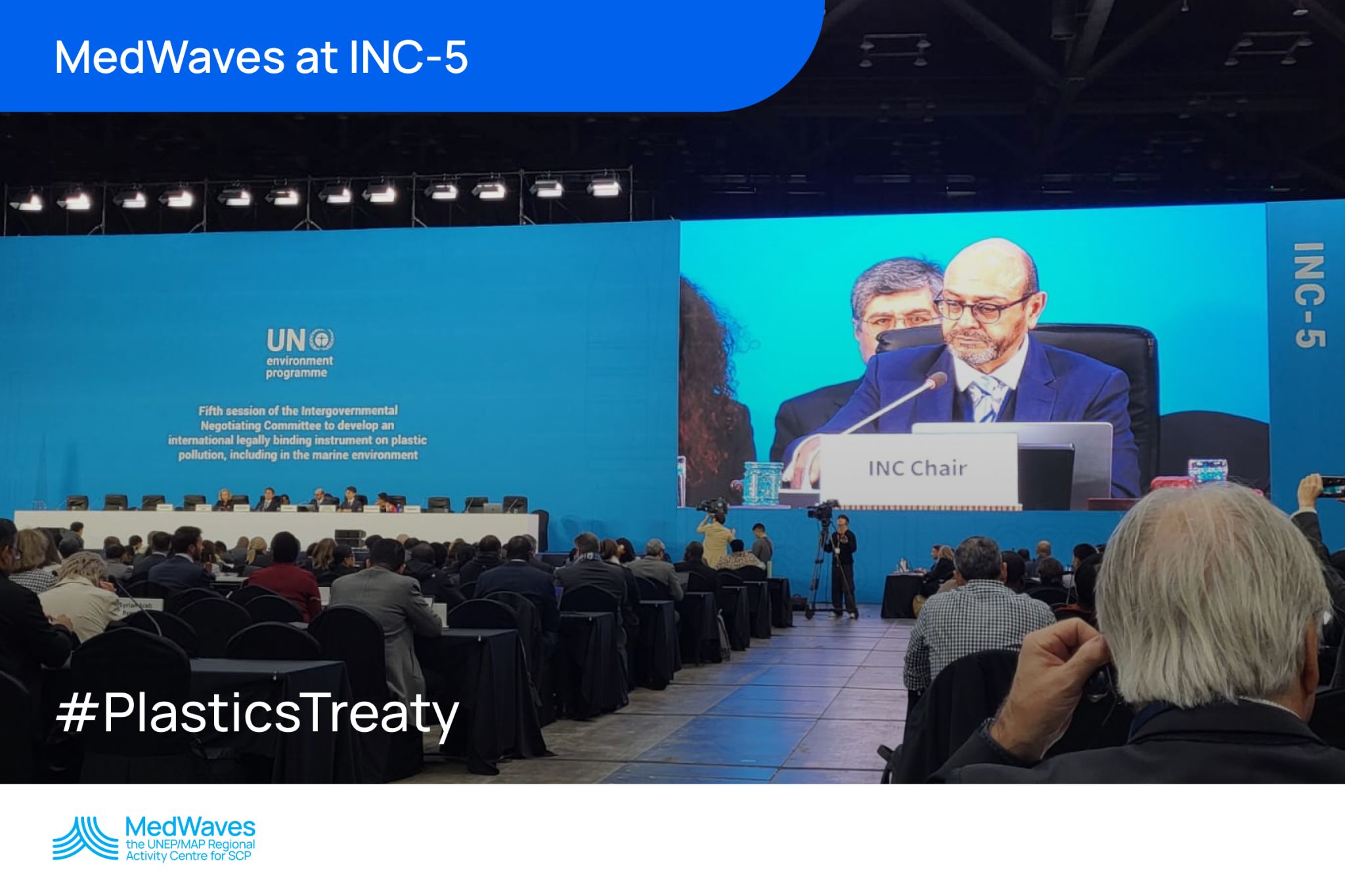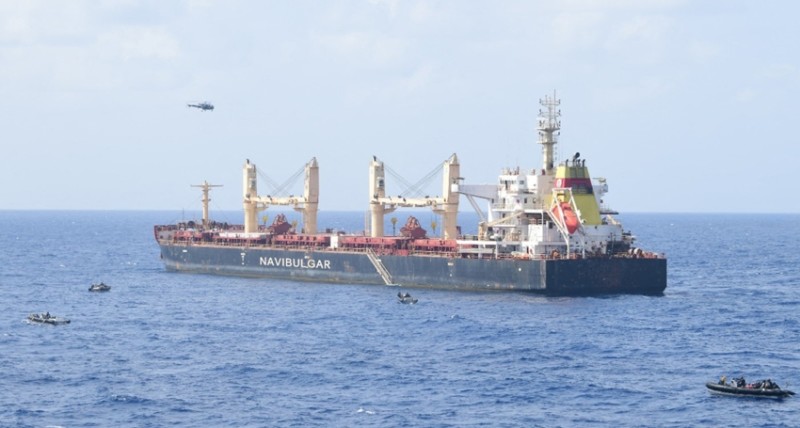The Growing Global Awareness of Plastic Pollution: A Sign of Optimism
The growing global awareness of plastic pollution is a signal of optimism. Across the globe, the overproduction and use of plastic have left the world with no choice but to rise to the challenge. This is particularly true in the Mediterranean region, where an average of 730 tons of plastic waste are generated daily. Every day! That’s equivalent to the weight of more than 70 whales being dumped into rivers and seas daily. MedWaves joined delegates from around the world in Nairobi, Kenya, from November 13 to 19, 2023, for the 3rd Intergovernmental Negotiating Committee (INC-3), a process aimed at drafting a legally binding international instrument (ILBI) on plastic pollution. Although much remains to be done, a future is taking shape to address the life cycle of plastics.
Growing from What We Know
It all starts with a first step. A single decision made in 2022 triggered a process that will forever change our world – a decision that sets the standards and regulations for a safer, healthier environment for both nature and populations. That decision was Resolution 5/14, adopted by UNEA-5.2, to “End Plastic Pollution: Towards a Legally Binding Instrument.” The first step in this process was the creation and subsequent meetings of the Intergovernmental Negotiating Committee (INC).
It takes time for a legally binding international treaty to be effective. Set to meet in five sessions, the third INC continues to work on developing a legally binding international instrument (ILBI) on plastic pollution. Just as it’s impossible to be fully prepared for a final exam on the first day of school, delegates and observers must begin in a situation that can be somewhat uncomfortable – a place where they do not yet know the exact details of what will result in the very first global treaty on plastic pollution.
INC-3 marked an important milestone in this process. While it was still in its early stages, the parties and observers demonstrated patience in gathering all viewpoints, needs, and perspectives, while showing foresight in anticipating how to serve the world appropriately today and in the future. INC-3 provided stakeholders with the first opportunity to review the draft document (UNEP/PP/INC.3/4). A draft document is an initial attempt to gather the key elements that will later form the ILBI. The draft includes the basics of the instruments, such as guiding principles, key definitions, and scope, with particular attention to product design, composition, and performance, waste management, and a just transition, among others. The work at this stage involves gathering and compiling the views and perspectives of delegates and observers.
Tallash Kantai, a plastics consultant, attended each of the INC meetings and discussed the current state of the zero draft compilation: « This process is completely overwhelming, but absolutely necessary. » She emphasized the importance of ensuring that all stakeholders feel and see their voices represented in the final treaty outcome, noting, “There’s no easy way to achieve this. Even though the revision is four times larger than what we initially proposed, it truly reflects the voices of all.”
A Regional Vision
The Mediterranean is a semi-closed basin, which naturally becomes a collection point for river flows depositing a large amount of waste from inland areas. The combination of a long coastline and maritime traffic makes the region one of the most affected by marine waste in the world (UNEP/WAP, 2015). Plastic is the most prolific marine waste in the region, accounting for up to 95-100% of all floating waste and over 50% of the waste deposited on the sea floor.
MedWaves, the Regional Activity Centre for Sustainable Consumption and Production (SCP) of UNEP/MAP (formerly SCP/RAC), hosted by the Catalonia Waste Agency, participated in INC-3 to offer support and share expertise in the fight against plastic pollution and marine debris. Situated in a hotspot for plastic pollution, MedWaves has become a leader in innovative solutions.
MedWaves has organized several programs across the region to take significant steps toward reducing plastic use and waste. MedWaves played a key role in developing the Regional Plan for Marine Litter Management in the Mediterranean and supporting a strong policy framework in the region with technical guidelines to help regulate single-use plastics (SUPs).
MedWaves supports the prevention of single-use plastic bags and the implementation of Extended Producer Responsibility (EPR) in several countries. Several tools have been produced to support capacity-building activities. Additionally, capacity-building programs support the use and implementation of these tools, such as in Tunisia to combat single-use plastic bags.
Guidelines for Combating Single-Use Plastics in the Mediterranean Region
Guidelines for Addressing Single-Use Plastics in Public Procurement in the Mediterranean
Guidelines for Phasing Out Single-Use Plastic Bags in the Mediterranean
MedWaves participated in discussions, including parallel events organized by sectoral organizations, which explored design options for systems throughout the product lifecycle, from plastic-containing product production to manufacturing and retail, waste management, and pollution reduction.
« It was incredible, constructive, fantastic, and truly encouraging to see the spirit of collaboration, compromise, and commitment that prevailed in Nairobi and allowed participants (delegations and observers) to discuss the contents of the zero draft document. There is still much work to be done! »
(Ignasi Mateo Rodríguez, Project Manager for Green Entrepreneurship and Civil Society at MedWaves)
Progress is being made: the world is getting closer to an ILBI on plastic pollution. Ms. Kantai stated that even though “we are moving slowly in the negotiations, we understand what the biggest issues this new treaty will address.” These include SUPs, including chemicals added to them and non-essential SUPs, and microplastics added to cosmetics. Another key component of the treaty will address design standards to ensure that plastic-containing products last longer, while simultaneously seeking to reduce plastic manufacturing.
Working Forward
Tackling the global challenge of plastic pollution, though urgent and necessary, can be overwhelming. Environmental health advocates and citizens have succeeded in raising public awareness about the truth behind chemicals and toxic waste, thus making the invisible visible. Another element of the challenge is that plastic pollution science is still evolving. Ms. Kantai cited recycling as an example: « While it used to be encouraged, it is now understood that recycling products containing toxic chemicals creates additional risks. »
Despite the immense challenges, Ms. Kantai remains optimistic: “There is absolutely incredible awareness, top to bottom and bottom to top.” She concluded by stating that if everyone does their part, the treaty will be easier to implement.
The INCs are important, but what happens between meetings is just as vital. The world is learning to apply scientific knowledge and develop capacities at all levels to change and transition in order to avoid plastic pollution. While the Secretariat works to refine the next draft, the world’s task is to continue highlighting and celebrating solutions and sharing knowledge.
MedWaves will continue to provide essential support to all the countries of the Barcelona Convention to implement policy measures and promote new sustainable business models. « Our goal is to facilitate a just transition to plastic-free solutions by promoting green entrepreneurship, while building a broad community of sustainable businesses across the Mediterranean, as reflected in the Switchers community. »
Source: Medwaves



